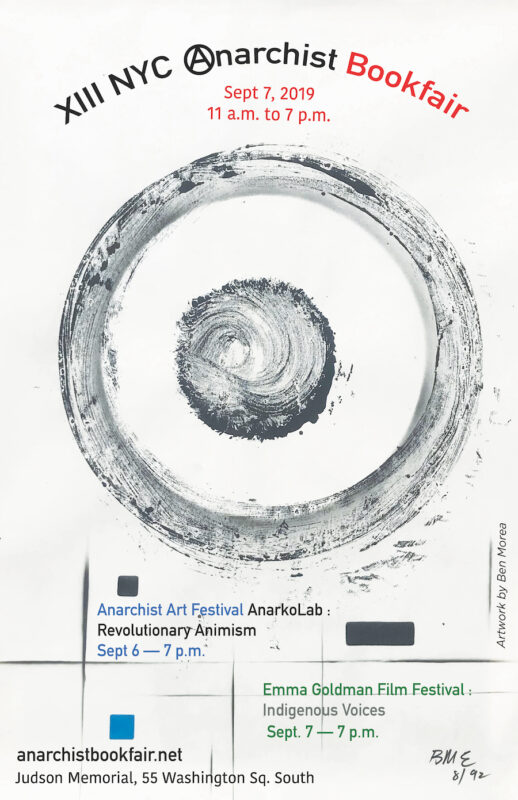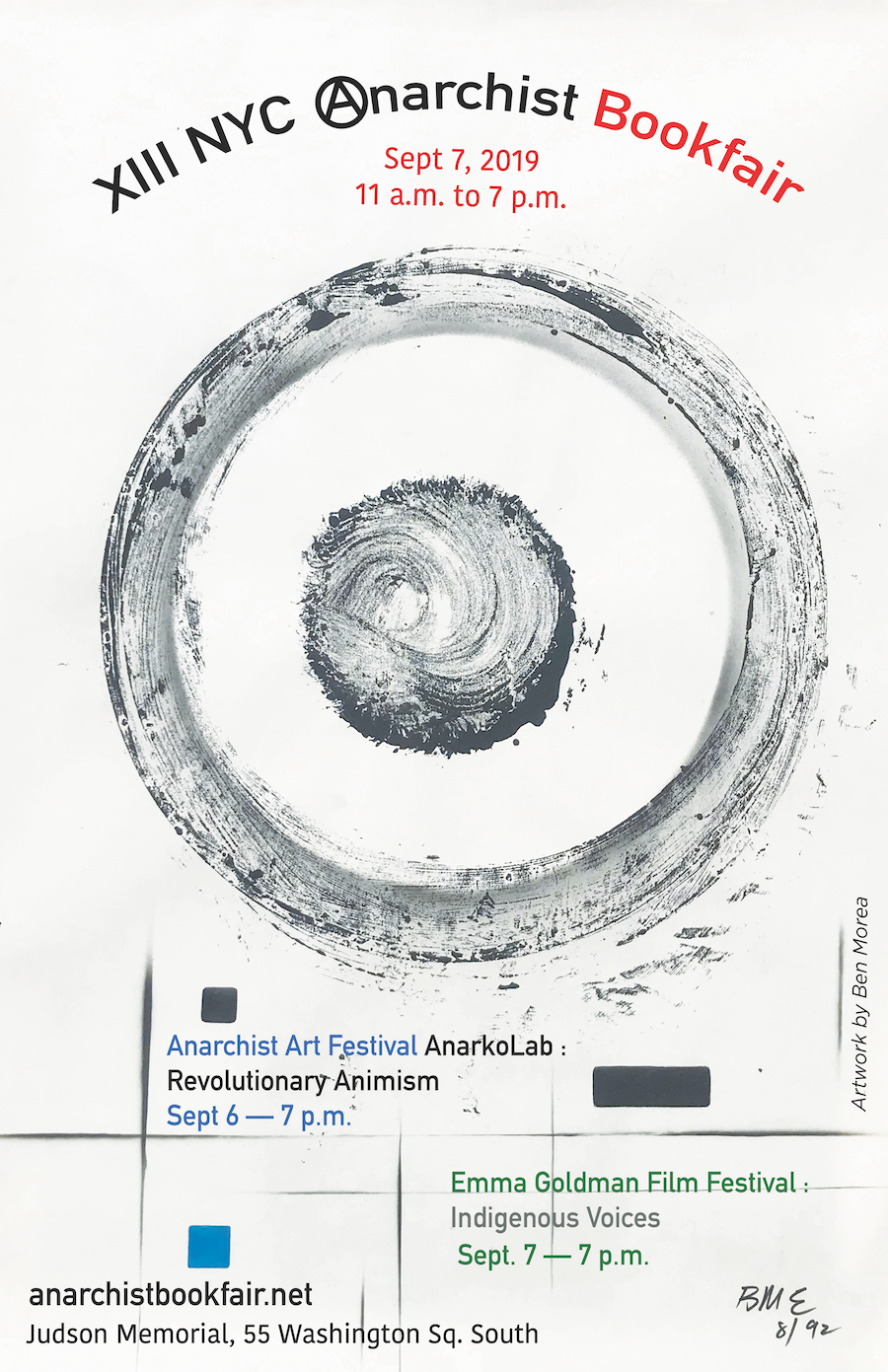September 6th and 7th, 2019
Press Contact:
NEW YORK— As climate emergency looms, the specter of war and fascism haunts us. In the media and in the world around us, we watch the super wealthy ruling corporative elites persisting in maintaining the exploitative death-culture hierarchy of white, cis, patriarchal, Imperialist, and colonial capitalism. At the NYC Anarchist Book Fair we believe that can be changed, and it takes a village to invent the future.
In its 13th edition, the book fair pays tribute to the anarchist and activist Willen Van Sprosen, who was killed as he tried to disrupt ICE camps activities, and the counterculture anarchist artist Ben Morea. An exhibition of Morea’s drawings (features in this year’s book fair Poster) will be exhibited during the bookfair and art festival. During the book fair, Morea hosts a workshop/dialogue session around Revolutionary Animism. Workshops also include Silvia Federici talking about “The Struggle for the Commons”, and debates on queer- trans feminisms, Antifa, immigrantion and ecology anarchism, among others. The book fair this year will offer a care-space, where healing practitioners and artists will offer group and individual care experiences.
The NYC Anarchist Book Fair aims at contributing to the ongoing dialogue, analysis and practice of current society, increasing knowledge about history, and create inspiration for the building of liberation alternatives such as mutual aid, autonomy, solidarity, collectivize and consensus based decision making, to name a few. We emphasize the creation of forward-looking activism and culture as we celebrate the struggle to free humanity, the animals and the planet from today’s predatory global political and social systems.
Together with the book fair, happen the NYC Anarchist Art Festival and the Emma Golden Film Festival. The first happens on the eve of the book fair, on Friday, with a diverse lineup including 50+ artists, focusing on performance art and collective creation collaboration, inspired by Ben Morea’s concept of revolutionary Animism. The Emma Goldman Film Festival this year focus on Narratives from Indigneous Peoples of the Americas, particularly on the indigenous people in Brazil.

All events take place at the Judson Memorial, 55 Washington Square Park South. The venue, in a neighborhood long associated with the anarchist movement in the U.S., has hosted the NYC Anarchist Book Fair nearly every year since its inception.
13th NYC Anarchist Art Festival ANARKOARTLAB
Friday, September 6, 2019 7 p.m. – 12 a.m.
A tribute to and with Ben Morea: Revolutionary Animism
FREE
13th Annual NYC Anarchist Book Fair
Saturday, September 7, 2019, 11 a.m.–7 p.m.
Books, art, workshops, skillshares, care-space and more
FREE
3rd Emma Goldman Film Festival
Saturday, September 7, 2019 7 p.m.–9 p.m.
Featuring: Narratives from Indígenous Peoples of the Américas
FREE
General Information
The NYC Anarchist Book Fair is a premier event for anarchists from across North America and around the world. It’s a gathering place for the anarchist community; a forum for activists, scholars and creative artists; and an opportunity for the curious to learn about an anti-state, anti-capitalist political tradition that’s still alive, thriving and challenging the established order.
Each year, the NYC Anarchist Book Fair hosts over 60 exhibitors including publishers, writers, designers, artists, musicians and other activists. Past line-ups of panels, workshops and other presentations have included such figures as journalist Chris Hedges; cartoonists Seth Tobocman, Peter Kuper, and Fly; photographer and Native American activist Lenny Foster; scholar/activists David Graeber, Silvia Federici, and Martha Ackelsberg; civil rights lawyer and radio host Heidi Boghosian; and former Black Panther and anarchist Ashanti Alston.
Judson Memorial Church, at the south end of Washington Square Park — the neighborhood that is one of the birthplaces of the anarchist movement in the US — has hosted the NYC Anarchist Book Fair nearly every year and will do so again in 2019.
History and Organizing
We are a group of anarchists spanning a broad anarchic spectrum. Our anarchy — the work we do, the organizations we participate in — is as varied as New York City itself. In the fall of 2006, a New York Metro Alliance of Anarchists (NYMAA) working group was established to discuss planning an anarchist Book Fair in New York City. Years of successful Book Fairs in San Francisco, Montreal, Baltimore and Toronto (to name just a few) made planning a Book Fair in New York City, with its large thriving anarchist community, a logical step. The first NYC Anarchist Book Fair was held in 2007 and we have been growing ever since. Inspired by the week-long Anarchy Celebration in the San Francisco Bay Area, we organize and help promote events around the Book Fair that include performance, music, film, readings and a wide range of workshops and panels.
We are always looking for more people to participate in the planning of the next Book Fair. The small number of people who participate in the day-to-day preparations of this event would shock and amaze you. The success of large-scale annual events depends heavily on a continual influx of new people, voices and ideas. It isn’t too late! We still need people to help make this year great! If you would like to help out with this year’s Book Fair or are interested in the planning of next year’s Book Fair, please contact the collective at
NYC Anarchist Art Festival
Hosted by AnarkoArtLab, the Art Festival gathers visual artists, performers, musicians, dancers and genre benders for a night of experimentation and collective creation.
For more information about the Art Festival:
anarchistbookfair.net/art-festival
NYC Anarchist Emma Goldman Film Festival
The Emma Goldman Anarchist Film Festival proudly presents an array of timely documentaries, lyrical montage and longer-form examinations of hope, struggle, autonomy, among other issues.
For more information about the Film Festival:
anarchistbookfair.net/film-festival
Judson Memorial Church
After the Second World War, ministers Robert Spike (1949-55) and Dean R. Wright, the Baptist minister to students at NYU (1948-52), started to rethink and redefine what a church could and should be. They were followed by Howard Moody (1956-92) who developed the vision further to its present understanding – basically that the role of the church, applied to the Judson Memorial Church, is to be a faith-based institution that responds to the societal issues of its time and place by working and advocating for progressive change – with special attention focused on the needs of people that many mainstream churches tend to overlook or find “undeserving”. This approach led the church in the 1940s-1960s to sponsor an interracial, international residence for students (1949-68) and to open the first drug-treatment clinic in Greenwich Village (1960-62). In the 1960s-1970s, Howard Moody and Judson’s program associate Arlene Carmen operated an abortion counseling and referral service before Roe v. Wade made abortion legal and the church pioneered a low-cost abortion clinic afterward. In the 1970s-80s, Moody and Carmen created a “ministry of presence” with street prostitutes. Also during the 1960s-1980s, Judson participated actively in the local and national movements for civil rights, peace, women’s rights and gay rights. During the 1980s, when Lee Hancock was associate minister (1980-85), Judson ran several health-care-related programs and more notably, was one of the few churches to acknowledge the AIDS crisis, operating a support group for those with HIV-AIDS and their caregivers and providing funerals for those who died of AIDS when other churches were turning them away. Judson has become known as a home for innovative, often avant-garde, artists in many genres – dance, painting, theater, etc. In the 1950s-1960s, it ran an Art Gallery at which several now-famous artists (Claes Oldenburg, Allan Kaprow, Yoko Ono and many others) found a place that would show their unconventional works. But in the mid-1960s, with the ferment of the experimental arts all around, Judson relaxed a lot of the formalities while keeping the basic outline on most Sundays. An “agape” service replaced the formal communion on first Sundays with an informal bread and cheese brunch around tables and the ritual of communion using the food and drink already at hand.
